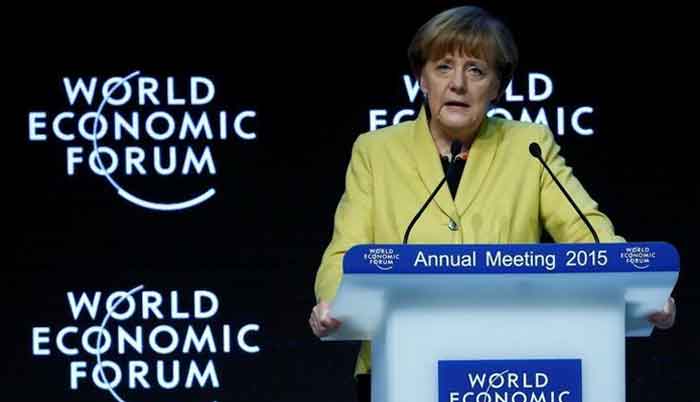![]() Home > Europe
Home > Europe
Germany's Left Parties Set Conditions for Tie-Up to Threaten Merkel

FILE PHOTO - German Chancellor Angela Merkel makes a speech during the session ''Global Responsibilities in a Digital Age'' in the Swiss mountain resort of Davos January 22, 2015. | PHOTO: REUTERS/Ruben Sprich/File Photo - RTX2X8IY
![]() January 9th, 2017 | 08:26 AM |
January 9th, 2017 | 08:26 AM | ![]() 1786 views
1786 views
BERLIN
Germany's left-leaning parties have set terms for forming a potential coalition after September's election in a tie-up that could replace conservative Chancellor Angela Merkel.
Together, lawmakers from the center-left Social Democrats (SPD) and the smaller leftist Linke party, along with the environmentalist Greens, have more seats in parliament than Merkel's conservative bloc. Latest polls show this would continue to be the case.
However, the center-left SPD, which rules with Merkel in a right-left federal "grand coalition", has long refused to cooperate with the Linke at the national level, largely because of the party's foreign policy views.
Both parties said they would want to see significant policy moves in order to consider working together.
Signaling a readiness for change, Vice Chancellor Sigmar Gabriel (SPD), told Der Spiegel magazine: "We don't want a new edition of the grand coalition."
"If it happens too often, then those who are dissatisfied only have the choice between extreme left or right," he added.
The parties have already met to explore the possibility of forming a coalition to replace Merkel after the election.
"Of course, I can imagine a Red-Red-Green coalition, if it allows the formation of a stable government. But that depends completely on the Linke," Gabriel said. "They must decide whether they want to govern or remain a radical opposition."
Merkel's conservative bloc ruled in a grand coalition with the SPD from 2005 to 2009, then with the smaller liberal Free Democrats (FDP) from 2009 to 2013, after which she teamed up with the SPD again in another grand coalition.
The SPD would not go along with policies like leaving the euro, said Gabriel. Sahra Wagenknecht, who leads the Linke in the Bundestag lower house of parliament, sees problems in the existing set-up of the single European currency bloc.
Wagenknecht said she hoped the SPD, after ruling with Merkel's conservatives, could strengthen its social policies.
Arguing that the SPD had been involved in cuts to social services that hurt its electorate, Wagenknecht added: "The stronger we perform, the greater the chance the SPD will correct its course there and, of course, that we can form a joint government."
A fractured electoral landscape risks complicating the coalition arithmetic, with a repeat version of the incumbent 'grand coalition' of Merkel's conservative bloc and Gabriel's Social Democrats the only outcome that looks a sure possibility.
Much will depend on the performance of two parties now not even represented in the Bundestag: the FDP, which faces a battle to clear the 5 percent hurdle to win seats in the lower house, and the anti-immigration Alternative for Germany (AfD) party.
An Emnid poll of 834 voters for weekly newspaper Bild am Sonntag put support for Merkel's conservative bloc at 38 percent, up 2 percentage points from a week ago, the SPD on 22 percent, up 1 point, the AfD on 12 percent, the Greens on 10, the Linke on 9 percent and the FDP on 5 percent.
Security policy has become a greater focus of the political debate in Germany since the Christmas market attack in Berlin that killed 12 people. Pollsters say this benefits Merkel's conservatives and the AfD, not the left-leaning parties.
In a sign the conservative bloc is perhaps ready for change too, the secretary general of Merkel's Christian Democrats (CDU), Peter Tauber, told Bild am Sonntag: "It is often stressful in the grand coalition, because Sigmar does not know in the morning what Gabriel will want in the evening."
(Editing by Alexandra Hudson)
Source:
courtesy of REUTERS
by Paul Carrel
If you have any stories or news that you would like to share with the global online community, please feel free to share it with us by contacting us directly at [email protected]